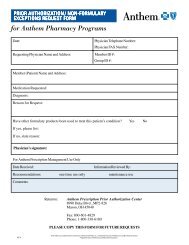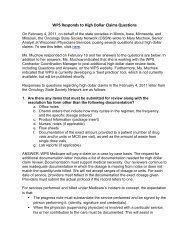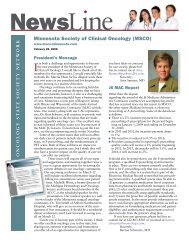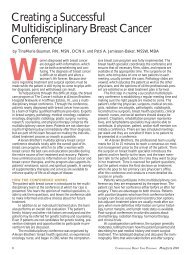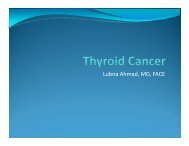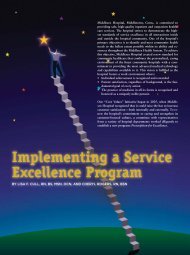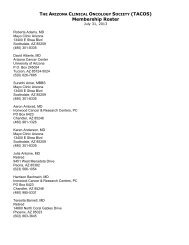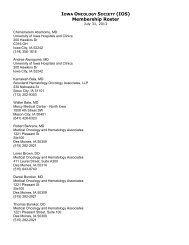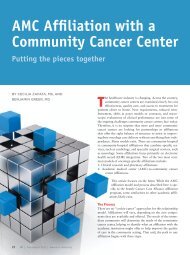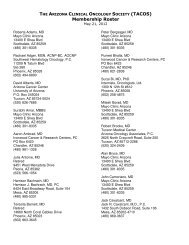Cancer Program Guidelines - Association of Community Cancer ...
Cancer Program Guidelines - Association of Community Cancer ...
Cancer Program Guidelines - Association of Community Cancer ...
You also want an ePaper? Increase the reach of your titles
YUMPU automatically turns print PDFs into web optimized ePapers that Google loves.
Chapter 1: Institutional and <strong>Program</strong>matic Resources<br />
Section 1<br />
<strong>Program</strong> Leadership<br />
Guideline I<br />
Administrative structure is in place to ensure efficient,<br />
appropriate, and effective management <strong>of</strong> the cancer<br />
program and services.<br />
Rationale<br />
The administrative leadership is responsible for maintaining<br />
high standards <strong>of</strong> patient care through the use <strong>of</strong> human,<br />
fiscal, and material resources. The administrative leadership<br />
must demonstrate commitment to excellence in cancer care,<br />
development and growth <strong>of</strong> multidisciplinary staff, and provision<br />
<strong>of</strong> comprehensive programs and services. The administrative<br />
leadership must be accountable for the development<br />
<strong>of</strong> resources to both sustain and increase the program and its<br />
capability to meet the needs <strong>of</strong> the community that it serves.<br />
Characteristics<br />
A. The administrative leadership is appointed by the governing<br />
body, hospital, and/or parent organization, and<br />
is responsible for the development, implementation, and<br />
evaluation <strong>of</strong> the cancer program.<br />
B. The administrative leadership, qualified by education<br />
and experience, appropriately fulfills designated<br />
responsibilities. The administrator should have at least<br />
a bachelor’s degree in a healthcare pr<strong>of</strong>ession, business,<br />
economics, or related area, and 4-6 years <strong>of</strong> experience<br />
in healthcare management. Master’s level degree and<br />
training in a healthcare field are preferred.<br />
C. The administrative leadership creates an environment<br />
<strong>of</strong> trust and respect, balancing financial concerns with<br />
patient care needs.<br />
D. The administrative leadership ensures compliance with<br />
applicable laws, regulations, and pr<strong>of</strong>essional accreditation<br />
standards.<br />
E. The administrative leadership:<br />
1. Creates and facilitates the multidisciplinary team<br />
for development <strong>of</strong> the program’s strategic plan<br />
throughout the continuum <strong>of</strong> care<br />
2. Implements a management structure to develop<br />
program goals and objectives, to maintain<br />
accountability for outcomes, and to perform cost<br />
analysis for cost-effective use <strong>of</strong> resources<br />
3. Creates access to financial, human, and material<br />
resources necessary for comprehensive service<br />
and program planning, implementation, and<br />
evaluation.<br />
F. The administrative leadership gathers and assimilates<br />
program-related data from appropriate sources and disseminates<br />
them in a timely manner to the leadership<br />
team and cancer committee for evaluation, review, and<br />
revision <strong>of</strong> goals and objectives annually and as needed.<br />
G. The administrative leadership assumes accountability<br />
for the financial viability <strong>of</strong> the cancer program;<br />
establishes and implements program budget, monitors<br />
financial data, and assumes accountability for budget<br />
and variances; coordinates effective billing and reimbursement<br />
procedures to ensure maximum appropriate<br />
reimbursement for services; and secures adequate<br />
supplemental funding.<br />
H. The administrative leadership ensures sound partnership<br />
with healthcare providers/pr<strong>of</strong>essionals by sharing<br />
accountability for the overall quality <strong>of</strong> care and financial<br />
viability <strong>of</strong> the cancer program.<br />
I. The administrative leadership ensures adequate multidisciplinary<br />
staffing to meet the needs <strong>of</strong> cancer patients<br />
and their families.<br />
Section 2<br />
Medical Leadership<br />
Guideline I<br />
The program has a designated medical director on a<br />
part-time or full-time basis.<br />
Rationale<br />
A medical director, with experience in multidisciplinary<br />
cancer care, provides medical leadership as well as clinical<br />
expertise and administrative competencies for optimal<br />
program outcomes.<br />
Characteristics<br />
The background <strong>of</strong> the medical director should include the<br />
following:<br />
A. Documented training, experience, and competence in<br />
cancer care, such as board certification in a recognized<br />
oncology specialty<br />
B. Experience in multidisciplinary cancer care and support<br />
<strong>of</strong> such care throughout the cancer program<br />
ACCC <strong>Cancer</strong> <strong>Program</strong> <strong>Guidelines</strong> Chapter 1 Institutional and <strong>Program</strong>matic Resources 5



